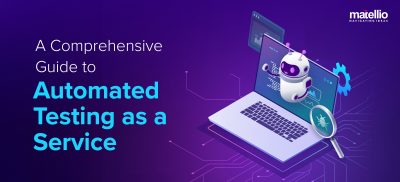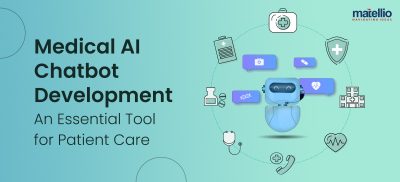
The manufacturing industry is evolving with the ladder of cutting-edge technologies. Do you also want to enhance your production process by adding the potential of next-gen technology? In that case, consider integrating deep learning in manufacturing. It will help you optimize the products, automate your quality control tasks, predict maintenance needs ahead of time, and more.
Deep learning has the power to transform your manufacturing business by adding the tools necessary to thrive in today’s competitive landscape. Through this blog, we will be exploring potential advantages that deep learning can offer to your manufacturing operations. We have also discussed applications and challenges associated with implementing deep learning enterprise solutions.
So, let’s dive in!
What is Deep Learning in Manufacturing?
Deep learning (DL) is a subset of machine learning that uses neural networks and other ML techniques for solving complex issues and optimizing the process within your manufacturing business.
The algorithms that deep learning utilizes are a subset of artificial intelligence and are designed to process and learn after analyzing a vast amount of data. It is capable of identifying patterns, making predictions, and automating your tasks without explicit programming.
Not just the manufacturing industry but many other sectors are also investing in deep learning custom enterprise software development. Below, we have mentioned some of the major insights about the deep learning market size for your knowledge.
Benefits of Deep Learning in the Manufacturing Industry
The market stats mentioned above would have given you clarity about how fruitful it is to invest in this machine learning subset. Deep learning in manufacturing also has multiple perks to offer, and it’s time to reveal some of the major ones to you. After scrolling through the advantages of DL for your manufacturing business, you will be able to make a sensible decision related to this technology.
 Quality Control
Quality Control
Quality control is one of the crucial aspects of your business, and it can gain a major benefit from integrating deep learning applications in manufacturing process. Deep learning has the ability to identify even the minutest detail and revolutionize your quality control process. It uses advanced algorithms to analyze vast datasets and product images.
Deep learning systems can also identify defects and irregularities that might elude the human eye. By implementing deep learning in quality control processes, your manufacturing business can confidently deliver products that meet the highest standards.
 Process Optimization
Process Optimization
Moving further, we have process optimization, which is another significant perk of deep learning in manufacturing. This subset of ML steps in as a transformative force and can optimize the processes involved within your manufacturing business. By analyzing historical data and real-time parameters, deep learning algorithms identify patterns and inefficiencies.
These insights can empower you to fine-tune various aspects such as temperature, pressure, or production speeds in real time. By optimizing your operations, deep learning can enhance overall operational efficiency, reduce wastage, and minimize energy consumption.
Also Read- Machine Learning as a Service (MLaaS): Everything a Business Needs to Know
 Process Automation
Process Automation
Automation is one of the major reasons why businesses are leveraging digital transformation services from experts. And deep learning takes automation to new heights by enabling machines to learn and adapt autonomously. It is capable of understanding the complex pattern within the data to automate repetitive and labor-intensive tasks with unprecedented accuracy.
It will not only free up valuable time of your human resources but also ensure precision and consistency in every task. From data entry to documentation, deep learning-driven automation elevates your manufacturing processes.
 Customization and Personalization
Customization and Personalization
You will agree that the era of one-size-fits-all is evolving into a realm of tailored experiences. Deep learning has the ability to analyze vast datasets, encompassing customer preferences and market trends, to facilitate mass customization. By understanding individual customer needs, deep learning algorithms enable the production of customized products at scale.
Whether it’s personalized designs, specific configurations, or unique features, deep learning-driven customization ensures that your products resonate with each customer personally. Offering such a tailored service will not only boost your customer satisfaction rate but also open avenues for new revenue streams and long-lasting customer relationships.
 Enhanced Decision-Making
Enhanced Decision-Making
Be it manufacturing or any other industry, making informed decisions can enhance the progress of your business. Deep learning in manufacturing augments your decision-making processes by processing and analyzing enormous datasets in real time.
By providing actionable insights and predictive analytics, deep learning algorithms empower you to make decisions with unparalleled accuracy and foresight. Whether it’s adjusting production schedules, optimizing supply chains, or anticipating market demands, the insights derived from deep learning foster agility and proactive decision-making.
Deep Learning Applications in Manufacturing Industry
After learning the benefits, it’s time to see how well this next-gen technology can fit within your business. Here, we have come up with a major deep learning application in manufacturing to help you gain more clarity.
 Maintenance
Maintenance
Maintenance plays an important role in ensuring efficiency in complex construction machinery. To make the maintenance process seamless, businesses today are leveraging AI development services. But let us tell you that deep learning transforms your maintenance strategies from reactive to predictively driven. Deep learning algorithms can analyze patterns and detect subtle deviations by using historical device data and real-time sensor inputs.
With this predictive maintenance approach, your business can identify potential breakdowns, enable timely repairs, reduce costly downtime and maintenance, realize that your devices will last longer, provide optimal maintenance schedules, and increase overall operational efficiency while embracing deep learning in maintenance practices.
 Predictive Analytics
Predictive Analytics
Predicting future events and trends is vital for your strategic decision-making process. Deep learning has the ability to process large and diverse data from your different manufacturing processes. By identifying complex patterns in historical data, deep learning systems predict market demand, product development, and consumer preferences.
With this insight, your business can anticipate changes in the market, optimize inventory, and streamline production. Predictive analytics driven by deep learning ensure that your production processes are agile and seamlessly adapt to changing market dynamics.
Also Read- How is AI Impacting Predictive Analysis?
 Supply Chain Management
Supply Chain Management
Modern supply chains are an incredible combination of strategies, and deep learning manufacturing, along with RPA in manufacturing, can drive and manage any of the complexities involved in the process. It can provide real-time insights and optimization for your supply chain process. It can analyze the data across the supply chain, from vendor behavior to logistics, and deep learning systems identify bottlenecks within.
With this next-gen technology, you can streamline processes and optimize your inventory levels. It ensures on-time delivery, reduces supply chain cost overruns, and optimizes supply chain relationships.
 Product Development
Product Development
Another deep learning for smart manufacturing methods and applications includes product development processes. Deep learning acts as a catalyst for massive product change by analyzing market trends, customer reactions, and competitor strategies. Deep learning programs can reveal valuable insights that can drive the ideation and planning phase, ensuring that your product is aligned with your target audience.
Additionally, deep learning aids in materials analysis help to identify innovations that will increase product durability and efficiency. By embedding deep learning into product development, your business stays at the forefront, introducing products that capture markets and set industry standards.
 Quality Assurance
Quality Assurance
The next application of deep learning in manufacturing is within your quality assurance process. It is one of the significant parts of your manufacturing business that cannot be ignored or handled loosely. It is the reason why you can trust deep learning, as it improves this critical process to unprecedented accuracy. Deep learning systems, given object images and sensor data, can detect even subtle errors or anomalies.
With this meticulous inspection, you can ensure that every product that leaves your facility meets impeccable quality standards. By strategically implementing deep learning, your business not only reduces errors and waste but also establishes a reputation for delivering excellent products with errors none for the customer intensity.
Challenges Faced When Implementing Deep Learning in Manufacturing
After going through the benefits and applications, you would be sure that incorporating deep learning into your manufacturing business isn’t just a technological upgrade; it’s a strategic investment that unlocks a world of possibilities.
From impeccable product quality and streamlined processes to personalized customer experiences, it can offer you much more.
But there are two major areas that can be challenging for you. You need to be careful of the mentioned challenges when integrating deep learning in manufacturing business.
Lack of Expertise
Embracing deep learning in manufacturing is undeniably powerful, but it comes with its challenges. One significant hurdle faced by many businesses is the lack of expertise. Deep learning is a complex field that demands a profound understanding of algorithms, data structures, and advanced programming languages.
You need to find and retain skilled professionals capable of navigating this intricate landscape. The scarcity of experts can impede the seamless integration of deep learning technologies into your manufacturing processes.
However, overcoming this challenge is not tough; all you need is to partner with experienced AI and machine learning consultants, just like how we have at Matellio. Leveraging the right technology consulting services for your deep learning solutions can harness the technology’s full potential, ensuring a smooth transition into the realm of AI-driven innovation.
Cost Considerations
While the benefits of deep learning in manufacturing are profound, the initial investment can be a significant concern, especially if your business falls under the small and medium-sized category. Acquiring the necessary computational resources, hiring skilled professionals, and developing customized deep-learning solutions demand a substantial financial commitment.
If you are operating your business on tight budgets, these costs can pose a challenge, potentially delaying or limiting the implementation of deep learning initiatives. To address this challenge, you need to do careful financial planning.
You can leverage the help of deep learning experts from a reputed AI development company like Matellio and conduct a comprehensive cost-benefit analysis to assess the potential long-term gains against the initial investment.
Additionally, you can consider hiring AI solution providers that offer scalable and budget-friendly services, ensuring that your business reaps the benefits of deep learning without compromising your financial stability.
Why Choose Matellio for Your Integrating the Power of Deep Learning in Manufacturing Business?
While the challenges mentioned above may seem daunting, they are not roadblocks but rather stepping-stones toward the transformative power of deep learning in manufacturing. By addressing these hurdles strategically, your business can harness the immense potential of this next-gen technology.
But the question is, how can you cross these, or any hurdles related to this project? Well, the answer is by choosing Matellio and its expertise!
Yes, we are a software development company with experience catering to almost every industry. Our experts are known to lead projects involving AI, ML, DL, IoT, and other advanced technologies. We have been paving the way for innovation, efficiency, and sustained growth in this dynamic landscape of modern manufacturing. And you can experience the same with us!
If you have any kind of confusion regarding how to use the power of deep learning to grow your manufacturing business, you can connect with our experts by filling out this form.

 Quality Control
Quality Control Process Optimization
Process Optimization Process Automation
Process Automation Customization and Personalization
Customization and Personalization Enhanced Decision-Making
Enhanced Decision-Making
 Maintenance
Maintenance Predictive Analytics
Predictive Analytics Supply Chain Management
Supply Chain Management Product Development
Product Development Quality Assurance
Quality Assurance


